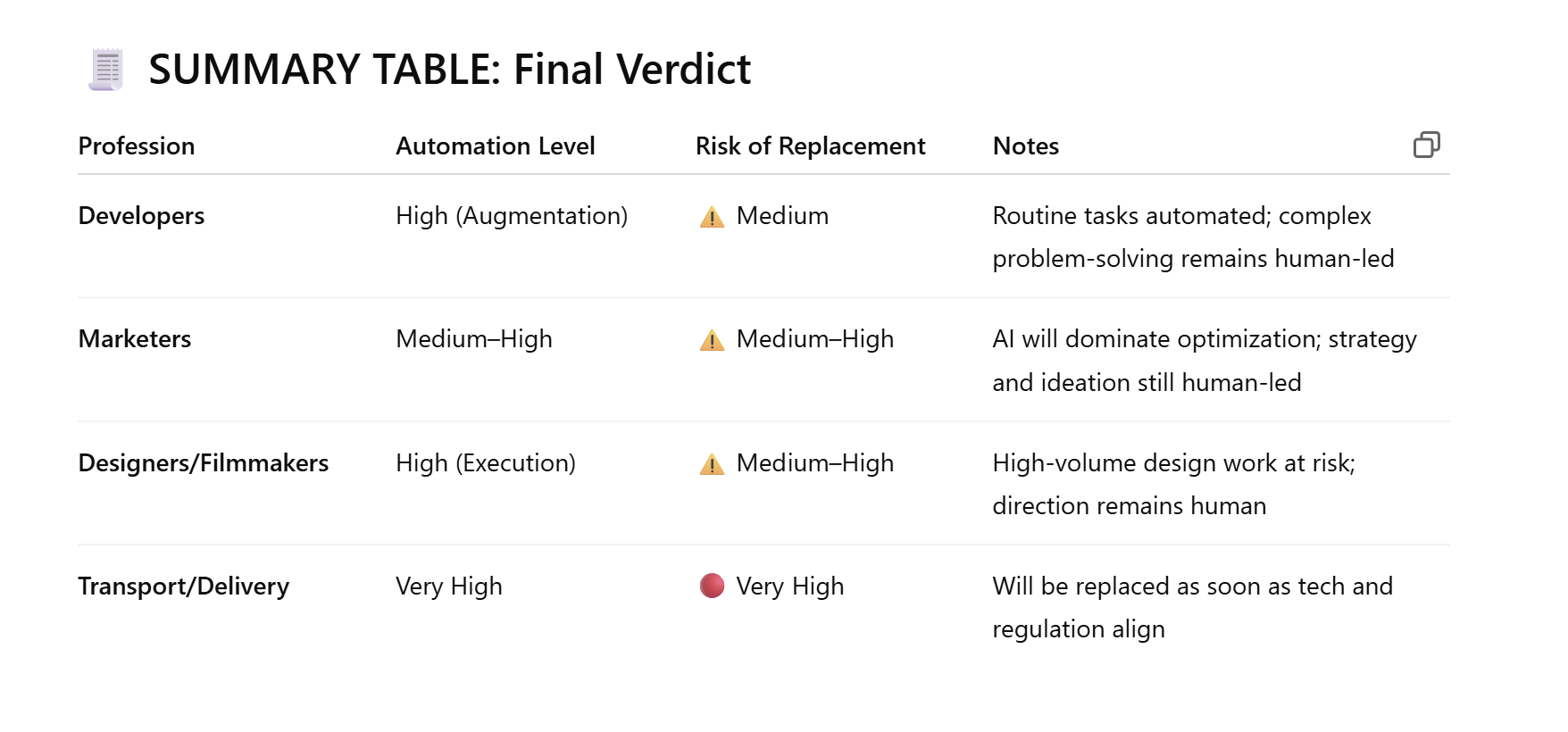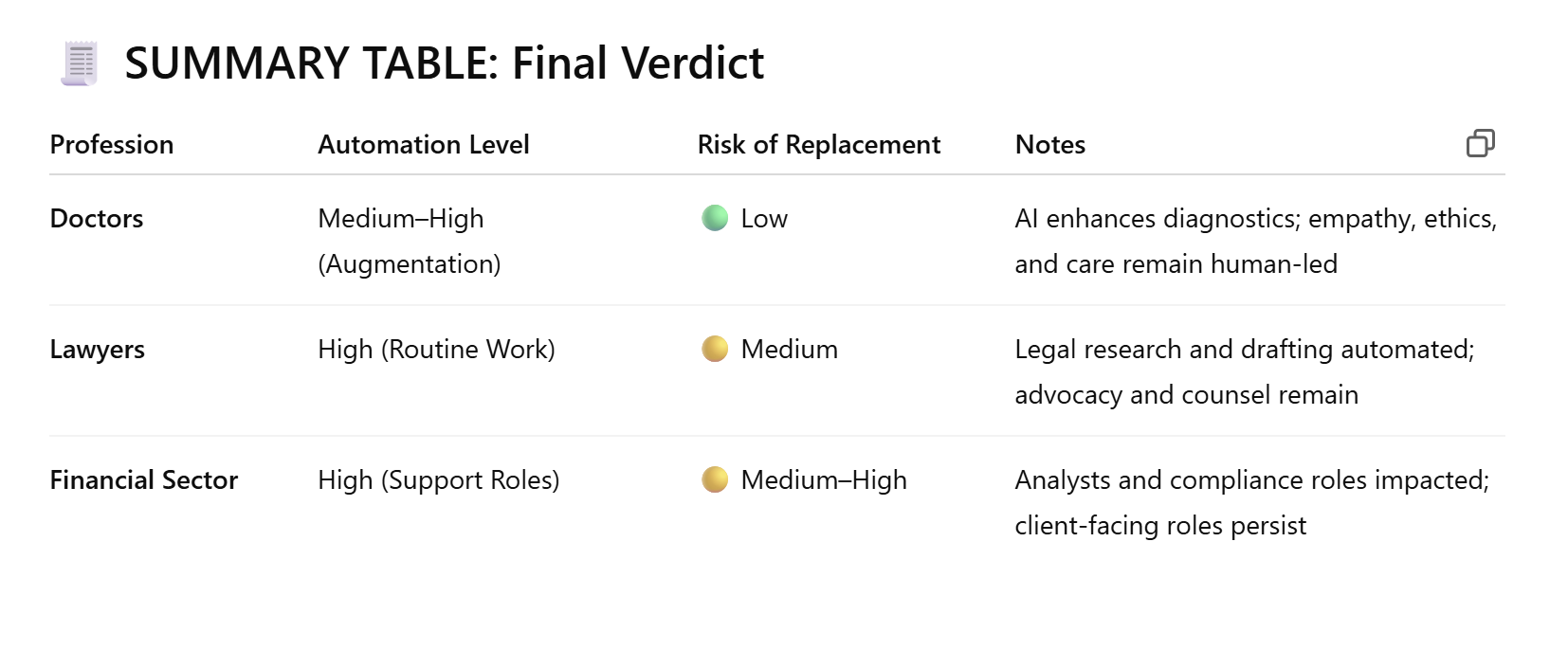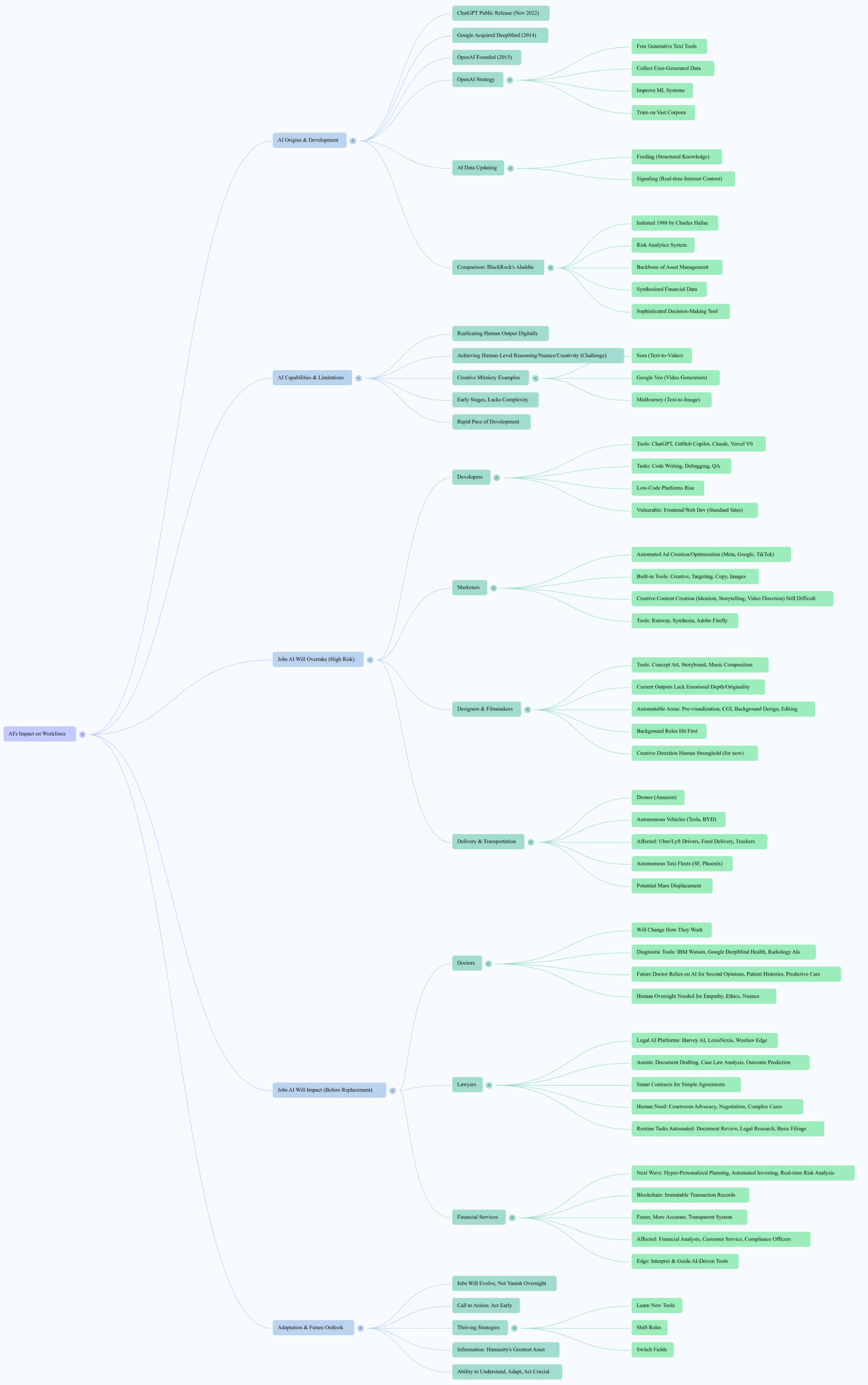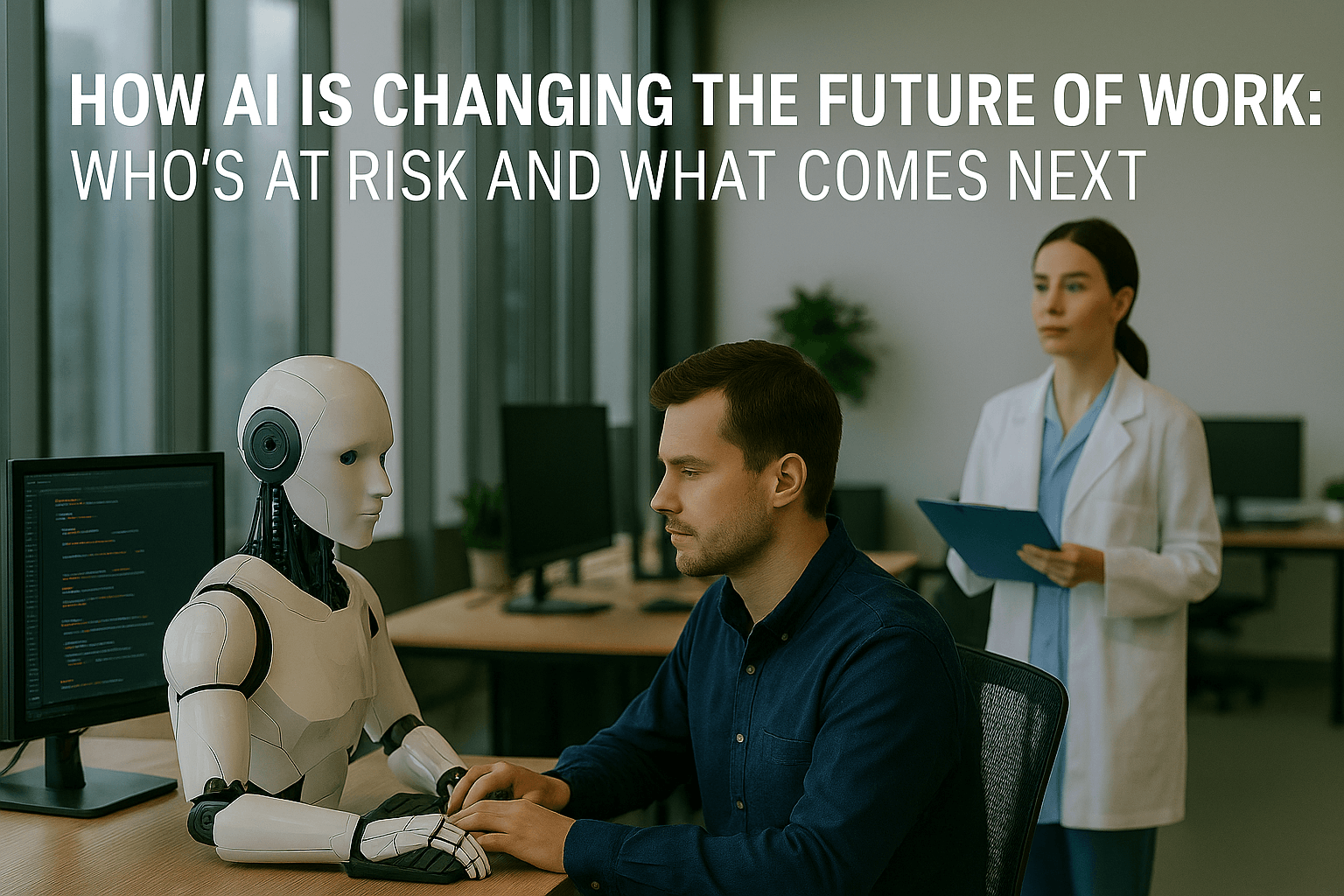Adapting to the Machine Age: A Guide to Surviving AI’s Impact on Jobs
Listen 👇 to the article in interview style conversation produced by Google AI.
How AI Is Changing the Future of Work: Who’s at Risk and What Comes Next?
Artificial intelligence (AI) gained widespread attention with the public release of ChatGPT in November 2022. Although Google acquired DeepMind in 2014 and OpenAI was founded earlier in 2015, it was ChatGPT that accelerated mainstream adoption. OpenAI’s strategy—offering generative text tools freely—allowed it to collect massive volumes of user-generated data, which in turn improved its machine learning systems. By training on vast corpora, including books, manuals, and online content, OpenAI enabled its models to process and synthesize information with unprecedented fluency.
Data has always existed—in books, articles, manuals—but never before has there been a mechanism capable of ingesting, understanding, and connecting it all at scale. OpenAI’s strategy, in some ways, echoes that of BlackRock’s Aladdin software.
Aladdin, or “Asset, Liability, and Debt and Derivative Investment Network,” was initiated in 1988 by Charles Hallac. It was developed as a risk analytics system and eventually became the backbone of BlackRock’s global asset management platform, handling trillions in assets. Aladdin synthesized historical financial data, predictive modeling, and real-time analytics, effectively becoming one of the most sophisticated decision-making tools in finance.
Like Aladdin in finance, ChatGPT (and similar generative AI models) must constantly be updated through two main channels: data “feeding” and “signaling.” Feeding involves inputting structured knowledge—books, documents, offline sources—into the model. Signaling, on the other hand, refers to capturing new and emerging content from the internet in real time. These massive inputs are processed by foundational models, which are then fine-tuned and aligned to deliver usable outputs based on human prompts.
Replicating human output digitally is one thing. Achieving human-level reasoning, nuance, and creativity is another. Tools like Sora (OpenAI’s text-to-video generator), Google Veo (Google DeepMind’s video generation platform), and MidJourney (a text-to-image AI) show glimpses of creative mimicry. However, they are still in early stages and lack the complexity and variability of human creativity. Yet, given the rapid pace of development, parity may not be far off.
This evolution raises critical questions: How will AI empower us? How will it displace us? And most importantly, which careers must adapt—or vanish entirely?
This article aims to forecast which professions are most at risk of AI replacement and disruption, divided into two categories: Overtaken and Impacted.
Jobs That AI Will Overtake
-
Developers
Ironically, developers—the very people who helped build AI—may be among the first to see their roles transformed or reduced. Tools like ChatGPT, GitHub Copilot (developed by GitHub and OpenAI), Claude, and Vercel’s V0 already assist in writing code, debugging, and automating QA tasks.
While highly customized software with complex architectures (multiple languages, databases, and APIs) still requires expert oversight, low-code platforms are on the rise. Imagine a future where a product manager, aided by a Copilot-like interface, can build apps using a joystick-style interface—drag-and-drop UI combined with generated backend code—while a QA engineer prompts a system check, and a sysadmin signs off deployment using AI auditing tools.
More vulnerable still are frontend and web developers building standard websites or e-commerce solutions. Platforms like Shopify and Squarespace are already cutting down on manual dev work. As AI-generated websites improve, demand for developers in basic scenarios will decline. The trend is inevitable.
-
Marketers
Meta (Facebook), Google, and TikTok are rapidly automating ad creation and optimization. Meta’s ad system now competes directly with human advertisers, using algorithms trained on decades of successful campaigns. With built-in tools to suggest creative, optimize targeting, and even generate copy or images, media buyers may soon find themselves redundant.
However, creative content creation—especially ideation, storytelling, and video direction—remains difficult for AI to fully master. As tools for generating content (like Runway, Synthesia, and Adobe Firefly) become better, traditional marketers will face increasing competition from machine-generated media—tuned precisely to the algorithm.
-
Designers and Filmmakers
While AI is still far from replicating the full creative power of auteurs like Quentin Tarantino or visual artists like Pablo Picasso, it’s on the path. Tools can already generate concept art, storyboard films, and even compose music. Although current outputs still lack emotional depth and originality, the direction is clear: pre-visualization, CGI, background design, and even editing are becoming automatable.
Expect background roles in film production and design—especially in large studios and agencies—to be hit first. Creative direction will remain a human stronghold for now, but it may soon require adaptation to AI workflows.
-
Delivery and Transportation
Logistics and transport are facing a double disruption: drones and autonomous vehicles. Amazon is actively developing drone delivery systems, and companies like Tesla and BYD are refining self-driving technologies. Uber and Lyft drivers, food delivery workers, and truckers are among those who may be impacted hardest.
This is not hypothetical. Autonomous taxi fleets already operate in cities like San Francisco and Phoenix. Once regulatory approval scales, the transportation labor market could face mass displacement.
Jobs That Will Be Impacted (Before Being Replaced)
-
Doctors
AI will not replace doctors anytime soon—but it will change how they work. Diagnostic tools like IBM Watson (albeit defunct), Google’s DeepMind Health, and various radiology AIs already outperform humans in specific diagnostic tasks. The future doctor will rely heavily on AI tools for second opinions, patient histories, and even predictive care models.
However, empathy, ethical judgment, and nuanced diagnosis still require human oversight. AI will augment healthcare, not remove the human element—yet.
-
Lawyers
Legal AI platforms are becoming increasingly sophisticated. Startups like Harvey AI and tools embedded in platforms like LexisNexis and Westlaw Edge already help draft legal documents, analyze case law, and predict legal outcomes. Smart contracts powered by blockchain and AI could eventually handle simple legal agreements autonomously.
Lawyers will still be needed for courtroom advocacy, negotiation, and complex cases—but routine tasks like document review, legal research, and basic filings are already being automated.
-
Financial Services
AI has long been a part of financial services, but the next wave involves hyper-personalized financial planning, automated investing, and real-time risk analysis. Combine this with blockchain’s ability to create immutable transaction records, and you get a system that is faster, more accurate, and more transparent than anything today.
Financial analysts, customer service reps, and compliance officers will feel this impact first. Those who can interpret and guide AI-driven tools will have the edge.
A Call to Action
This article isn’t a warning as much as it is a wake-up call. Jobs won’t vanish overnight, but they will evolve. And those who act early—learning new tools, shifting roles, or even switching fields—will be best positioned to thrive.
Information has always been humanity’s greatest asset. The ability to understand, adapt, and act on it is what will separate those who survive from those who flourish.
So ask yourself: what will AI do to your career, and what can you do to stay ahead of it?
Disclaimer: This article, along with all ideas expressed within it, was originally drafted by me. While it does not cover every job or profession, it highlights several of the most prominent roles expected to be replaced or impacted by artificial intelligence. I used ChatGPT to assist with grammatical refinement and to ensure alignment with the Chicago Manual of Style. Additionally, I consulted ChatGPT for a fact-checked analysis and final verdict on the professions most likely to be affected by AI. I encourage readers to engage with these insights not only for informational purposes but also to better anticipate and adapt to the evolving future of work.
ChatGPT Verdict for Jobs that will be replaced by AI:

ChatGPT Verdict for Jobs that will be Impacted by AI:

A Mind Mapping Diagram of This Article

Download Mind mapping Diagram

